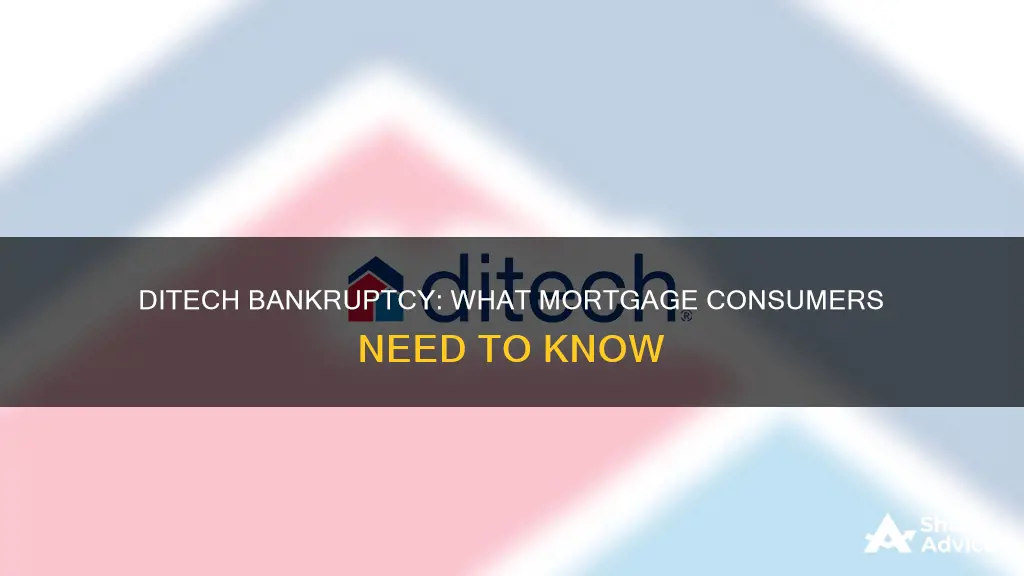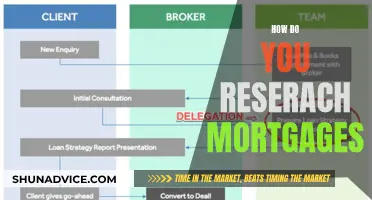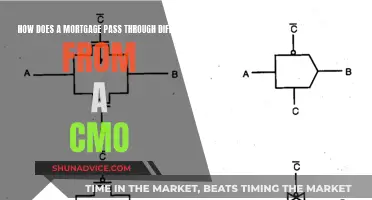
Ditech Holding Corp, a mortgage originator, filed for bankruptcy protection in February 2019, a year after emerging from a previous bankruptcy. This has caused concern for mortgage consumers, who fear their rights could be affected. A consumer committee was proposed to represent the interests of mortgage borrowers, but Ditech objected, claiming it would negatively impact their attempts to sell portions of their business. The bankruptcy court has yet to rule on the matter. With Ditech's financial woes, there is a worry that the company could use bankruptcy to bypass state court protections for borrowers in the foreclosure process, which could have adverse effects for some homeowners.
| Characteristics | Values |
|---|---|
| Date of bankruptcy | February 2019 |
| Previous bankruptcy | November 2017 |
| Company name | Ditech Holding Corp |
| Previous name | Walter Investment Management |
| Court | U.S. Bankruptcy Court for the Southern District of New York |
| Affected customers | ~4,600 |
| Affected customers' characteristics | Elderly, disabled, financially unstable, vulnerable |
| Affected customers' actions | Filed petitions, sought protection |
| Company actions | Fought back, filed a motion objecting to the committee |
| Company plans | Refocus on core business lines and markets |
| Company job losses | Undisclosed number |
What You'll Learn

Ditech's previous bankruptcy
Ditech, a mortgage originator, has had a tumultuous history, with financial woes impacting the company and its consumers. The company filed for bankruptcy protection in February 2019, just a year after emerging from a previous bankruptcy filed under the name Walter Investment Management in November 2017.
The impact of Ditech's previous bankruptcy was felt by mortgage consumers, with concerns raised about the protection of consumer rights and the potential negative consequences of the bankruptcy process. Advocacy groups and attorneys representing mortgage borrowers sought to create a committee to represent the interests of these vulnerable consumers, many of whom were elderly, disabled, and financially unstable.
Ditech's bankruptcy also affected borrowers with loans from Reverse Mortgage Solutions (RMS), a Ditech subsidiary. There were fears that Ditech's bankruptcy could strip RMS foreclosure litigants of their rights and impose undue hardships. Additionally, there were claims that Ditech failed to properly credit mortgage payments, levied improper fees, and mistakenly foreclosed on homes.
The company's financial troubles resulted in job losses as part of a plan to refocus on core business lines and markets. Despite these challenges, Ditech emerged from its previous bankruptcy and rebranded, only to find itself in financial distress again in 2019. The repeated financial issues highlight the vulnerability of mortgage consumers and the importance of ensuring their rights and interests are protected during bankruptcy proceedings.
Understanding Mortgage Balance Increase: What You Need to Know
You may want to see also

Reverse mortgage scams
Reverse mortgages are loans that allow homeowners aged 62 and older to borrow against the equity in their homes. While these loans can provide additional financial support to seniors in retirement, scammers often use this type of loan to con older Americans out of their money, equity, and homes.
- Inflated appraisal scams: Scammers, including unscrupulous appraisers, attorneys, and loan officers, work together to inflate the appraisal of a home. They convince the homeowner to get a reverse mortgage to cash in on the inflated equity. The scammers handle the documents and loan closing, taking the loan proceeds and leaving the borrower with little to no equity or cash after paying closing costs and fees.
- Unnecessary reverse mortgages: In this scam, a financial planner or advisor talks a senior into getting an unnecessary reverse mortgage. They may handle the money themselves and use the proceeds for their own financial gain. This scam can also involve a loved one convincing the borrower to get a reverse mortgage and give them the proceeds or grant them power of attorney to make financial decisions, including obtaining a reverse mortgage.
- Foreclosure relief scams: Scammers promise to help seniors avoid foreclosure by offering a reverse mortgage. However, a reverse mortgage comes with high closing costs and fees, and the borrower is still responsible for paying property taxes, insurance, and maintenance costs. If these expenses are not kept current, the borrower could still lose their home.
- Misleading claims: Scammers target seniors with misleading claims about how a reverse mortgage works, such as saying it is free money or a solution to all financial problems. They may send unsolicited offers or use high-pressure sales tactics.
- Property purchase scams: Scammers purchase distressed or abandoned properties and recruit seniors to "purchase" the low-cost home by transferring the deed, claiming no money is required. However, the scammer often does not fix up the new home, and the senior may discover serious issues upon moving in. The scammer then disappears with the lump sum from the loan.
To protect yourself from reverse mortgage scams, it is important to understand how these loans work and be wary of unsolicited offers or pushy salespeople. Work with reputable lenders and seek counselling or advice from organisations such as the National Council of Aging or a HECM counselor.
Regarding the Ditech bankruptcy, victims of a reverse mortgage scam involving Ditech and its subsidiary, Reverse Mortgage Solutions, have expressed concerns about the potential impact on their rights and interests. Attorneys representing these victims have requested the creation of a committee of consumer creditors to ensure that borrowers are protected during the bankruptcy proceedings. There is a worry that Ditech could use bankruptcy to bypass state court protections for borrowers in the foreclosure process. As a result, mortgage borrowers have won protection in the Ditech bankruptcy, with the Trustee approving the creation of a consumer committee.
Shorting Mortgage Bonds: A Risky Bet on Interest Rates
You may want to see also

Consumer rights and protection
The Ditech bankruptcy has raised concerns about its potential impact on mortgage consumers, particularly those who are vulnerable. In this context, consumer borrowers refer to individuals with loans from Ditech or its subsidiaries, including Reverse Mortgage Solutions. These borrowers often include the elderly, people with disabilities, and those with low incomes or financial instability, making it challenging for them to advocate for themselves effectively.
To protect the rights and interests of these vulnerable consumers, several advocacy groups and attorneys filed petitions with the U.S. Trustee, requesting the formation of a consumer committee. The Bankruptcy Court of the Southern District of New York approved the creation of this committee, ensuring that the views and concerns of borrowers are represented and heard during the critical stages of Ditech's bankruptcy proceedings and proposed plans.
The consumer committee aims to safeguard consumer borrowers from potential negative consequences resulting from Ditech's bankruptcy. One significant concern is Ditech's assertion that loans in foreclosure should not be subject to an automatic stay as ordered by the bankruptcy court, which could strip borrowers of their rights and impose hardships on them without enforceable remedies. The involvement of the consumer committee is intended to prevent such adverse outcomes and ensure that the bankruptcy process does not unjustly displace borrowers from their homes.
Additionally, the Hawaii Division of Financial Institutions (DFI) has provided assurances to consumers doing business with Ditech Financial and Reverse Mortgage Solutions, guaranteeing the safety and soundness of financial institutions and regulatory compliance. Consumers affected by the temporary freeze on Ditech Financial's accounts during the bankruptcy proceedings can refer to the DFI for guidance and protection of their rights and funds.
Understanding Wrap-Around Mortgages: An Example-Led Guide
You may want to see also

Foreclosure proceedings
Ditech's bankruptcy has raised concerns about its impact on mortgage consumers, particularly those facing foreclosure. Foreclosure proceedings can be a complex and stressful process for homeowners, and the Ditech bankruptcy adds another layer of uncertainty.
Ditech, a mortgage servicing company, filed for bankruptcy in February 2019, and its handling of foreclosure cases during this period has been scrutinised. There are worries that Ditech could use bankruptcy to bypass state court protections for borrowers in the foreclosure process. This could potentially leave borrowers vulnerable to unfair practices and wrongful foreclosures.
In response to these concerns, advocacy groups and attorneys have pushed for the creation of a consumer creditors' committee to protect the interests of mortgage borrowers. The committee aims to ensure that borrowers' rights are upheld and that they are not negatively impacted by Ditech's financial situation. This committee is particularly important for vulnerable borrowers, such as the elderly and those with low incomes, who may struggle to navigate the legal system on their own.
The involvement of a consumer committee has been a point of contention, with Ditech objecting to its formation and seeking to limit its scope or disband it altogether. The company argued that the committee would hinder its attempts to sell off portions of its business. However, the court approved the establishment of a five-member consumer committee, recognising the need to protect consumers' rights during the bankruptcy process.
For homeowners facing Ditech foreclosure, it is essential to seek legal assistance. Law firms specialising in consumer advocacy can help defend against foreclosure, ensure that proper procedures are followed, and determine eligibility for loan modifications. Homeowners can also contact their state's attorney general, who may provide support and monitor borrower-sensitive issues during foreclosure proceedings.
Retirement Savings: Easier Mortgage Approval with a 401k
You may want to see also

Ditech's financial woes
Ditech, a mortgage originator, first filed for bankruptcy in 2017 under the name Walter Investment Management but later emerged from it and rebranded. However, in 2019, the company found itself in financial trouble again, seeking bankruptcy protection for the second time. This has led to worries about the impact on consumers, especially those with loans from Ditech or its subsidiaries, such as Reverse Mortgage Solutions (RMS).
One of the main concerns is that Ditech has asserted that its loans currently in foreclosure should not be subject to an automatic stay as ordered by the bankruptcy court. This could potentially strip borrowers of their rights and impose hardships on them, especially those who are elderly, disabled, or financially unstable. In response, a consumer creditors' committee has been established, but there are ongoing objections and legal battles regarding its scope and involvement.
The situation has caught the attention of state officials, such as the New York Attorney General, who is monitoring how Ditech handles borrower-sensitive issues like foreclosure proceedings and loss mitigation. There are concerns that Ditech might use bankruptcy to bypass state court protections for borrowers. As a result, consumer protection committees and legal representatives are actively working to ensure that the rights of borrowers are upheld and that they are not negatively affected by Ditech's financial troubles.
Removing Deceased Spouse from Mortgage: What You Need to Know
You may want to see also
Frequently asked questions
Ditech Holding Corp, a mortgage originator, filed for bankruptcy protection in February 2019, a year after emerging from a previous bankruptcy.
The Ditech bankruptcy might impact consumers who have loans with Ditech or its subsidiaries. There are concerns that Ditech could use bankruptcy to bypass state court protections for borrowers in the foreclosure process. There are also concerns about the impact on vulnerable consumers, including the elderly and those with disabilities.
Mortgage consumers have raised concerns about improper activity and wrongdoing by Ditech, including allegations of not properly crediting mortgage payments, levying improper fees, and mistakenly foreclosing on homes. There are also concerns about delays and improprieties in the loan modification process.
Several advocacy groups and attorneys have filed petitions requesting the creation of a consumer committee to represent the interests of mortgage borrowers affected by the Ditech bankruptcy. A five-member consumer committee was approved, but Ditech objected and requested that the committee's scope be limited and its fees capped. The Bankruptcy Court of the Southern District of New York has yet to rule on this matter.







